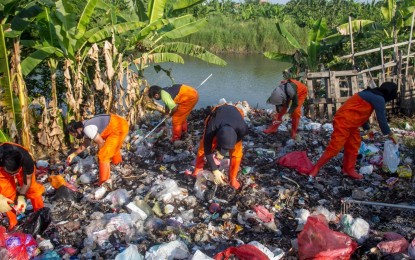
WORLDWIDE PROBLEM. The proliferation of plastic wastes is a global concern. Break Free From Plastic, a global movement that was launched in 2016 and has been releasing reports since 2018, works with volunteers and non-governmental organizations to count and document the brands on plastic waste found in countries. (Photo courtesy of BFFP)
MANILA – A group of environmental advocates is urging the government to institute measures to address the country's problem of plastic wastes.
Members of Break Free from Plastic (BFFP) are seeking a nationwide ban on single-use and problematic (non-recyclable) plastic products.
"Impose accountability and liability on corporations for the waste on packaging and end-of-life of their products," the group also said in its Philippine Brand Audit Results report released this week.
BFFP cited the need to implement mechanisms for fostering growth and innovations in eco-friendly and alternative product packaging and delivery systems.
There's also a need to impose "hefty" penalties on corporations and individuals failing to address waste and pollution as well as not adhering to clean production standards, the group continued.
"Support cities and communities in their programs to ban or regulate the use of single-use plastics and packaging products," the group said.
BFFP raised the urgency for such measures, noting that results of its 2020 brand audit showed only about two percent of plastic waste collected in the country can be considered recyclable materials.
"The biggest bulk, at 98 percent, is single-use plastics that are not recyclable and have no economic value," the group said.
Recyclable material is "any waste material retrieved from the waste stream and free from contamination that can still be converted into suitable beneficial use or for other purposes," according to Republic Act (RA) 9003 (Ecological Solid Waste Management Act).
Newspapers, ferrous scrap metal, non-ferrous scrap metal, used oil, corrugated cardboard, aluminum, glass, office paper, and tin cans are among recyclable materials, noted RA 9003.
Recycling plastics "has never been the solution," the group said.
"The real long-term response to the plastic waste problem is to regulate the production and use of this problematic product," it said.
The group’s members have been spearheading brand auditing, a citizen action that involves counting, analyzing, and documenting plastic types, brands, and companies responsible for the plastic waste that end up in ecosystems, beaches, and urban centers.
Its 2020 Philippine brand audit showed eight companies have been the top plastics polluters in the country during the past three years: Nestle, Colgate-Palmolive, Unilever, Proctor and Gamble, Universal Robina Corporation, Monde Nissin Corporation, Nutri-Asia Inc., and Liwayway Holdings
The 2020 Philippine brand audit covered 38,580 pieces of branded plastic waste items recovered from 17 sites, the group added. (PNA)
